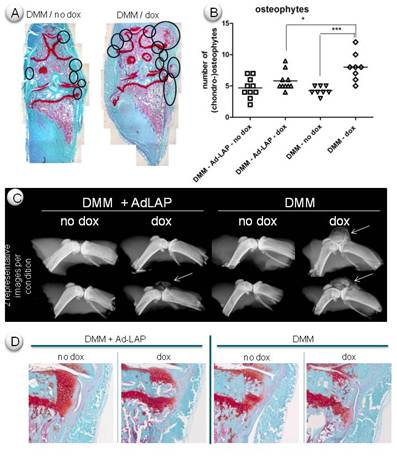Session Information
Session Type: Abstract Submissions (ACR)
Background/Purpose:
Osteophytes are a major hallmark of osteoarthritis (OA). Both TGF-beta and BMP2 can induce osteophytes in murine knee joints. We demonstrated that TGF-beta could induce chondrogenesis in mesenchymal stem cells when BMPs were inhibited but not vice versa. This suggested that BMP2 might require a trigger like TGF-beta to induce initial stages of chondrogenesis. Therefore, we investigated whether BMP2 was still able to induce osteophyte formation in experimental OA when TGF-beta activity was blocked.
Methods:
We made a unique transgenic mouse (Col2a1-rtTA-BMP2) expressing BMP2 under control of the Col2a1 promoter, only when exposed to doxycycline (dox) which results in only chondrocytes producing BMP2. These mice were fed dox-food up to 8 weeks to investigate BMP2 effects on osteophyte formation. We induced the DMM-model and investigated whether BMP2 augmented osteophyte formation. We combined the DMM-model with intra-articular injection of an adenovirus overexpressing TGF-beta-inhibitor LAP with or without dox. Knee joints were isolated 4 weeks after DMM for histology.
Results:
There was no significant difference in osteophyte formation between dox and non-dox treated Col2a1-rtTA-BMP2 mice. However, dox treatment increased the number of osteophytes (8.0) during DMM compared to DMM non-dox (4.25). These “new” osteophytes were Iarger than DMM-induced osteophytes. The lack of osteophytes by dox compared to DMM+dox implied that DMM provided a trigger enabling BMP2-induced osteophyte formation. To investigate whether TGF-beta was that trigger, we injected Ad-LAP one day after DMM-induction. Without TGF-beta, BMP2 no longer augmented the number of osteophytes during DMM. Strikingly, inhibition of TGF-beta significantly reduced the pace of osteophyte formation.. This was completely abolished by the presence of BMP2 restoring the speed of osteophyte formation and maturation.
Conclusion:
Our data show that BMP2 is capable of inducing osteophyte formation, but is dependent on an additional trigger to achieve this, as present in OA. In OA conditions, BMP2 can severely aggravate osteophyte formation, both in number and size. However, when TGF-beta is blocked BMP2 is no longer capable of aggravating osteophyte formation during DMM. Strikingly, early inhibition of TGF-beta during OA impaired the speed of osteophyte formation, which could be compensated by the presence of BMP2. Our data show for the first time that BMP2 is dependent on TGF-beta to induce de novo osteophyte formation. This provides novel insight into the mechanism behind osteophyte formation and provides clues for future therapeutic application for osteophyte formation in OA.
Disclosure:
E. Blaney Davidson,
None;
A. Blom,
None;
A. van Caam,
None;
E. Vitters,
None;
M. Bennink,
None;
W. van den Berg,
None;
F. van de Loo,
None;
P. van der Kraan,
None.
« Back to 2014 ACR/ARHP Annual Meeting
ACR Meeting Abstracts - https://acrabstracts.org/abstract/bmp2-requires-tgf-beta-to-induce-osteophytes-during-experimental-osteoarthritis/

